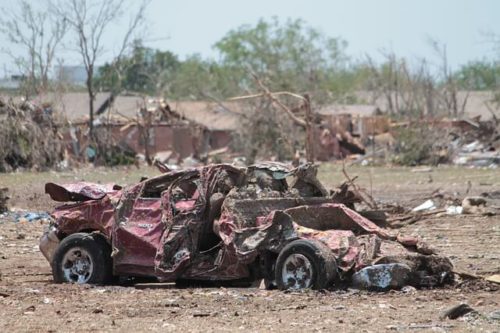
YouTube / iTunes / Spotify / Radio Public / Pocket Casts / Google Podcasts / Breaker / Overcast
Listen to ArtisanEnglish.jp posts & lesson intros here.
Word of the Day: Write-off
If something is a write-off, it can no longer be used, or it was a complete waste of time.
The car in the accompanying picture was caught up in a tornado.
As you can see, it is no longer drivable.
Therefore, it’s a complete write-off.
The only thing that the owner can do is collect the insurance money (hopefully) and purchase another vehicle.
In cases where insured items are damaged or destroyed, they are written off the insurance company’s books.
Imagine the insurance company drawing a red line through the article in the documents, signifying the item no longer exists.
Regarding time, we could think about the Trans-Pacific Partnership (TPP).
The United States is no longer taking part in the TPP.
All the time the participating countries spent negotiating with the United States was a complete waste of time and, therefore, a write-off.
In extreme cases, we can also consider individuals to be lost causes and write them off.
Unfortunately, some people participate in illegal activities such as drugs or theft.
If these people refuse help, others may consider them to be write-offs.
What I mean is they will consider them as lost causes and either throw them in jail or start to ignore them.
It’s sad, but it happens every day.
Flesch-Kincaid Readability Test
This post is understandable by someone with at least an 8th-grade education (age 13 – 14).
On the Flesch-Kincaid reading-ease test, this post scores 61.
The easier a passage is to read, the higher the score on a scale of 0 – 100.

